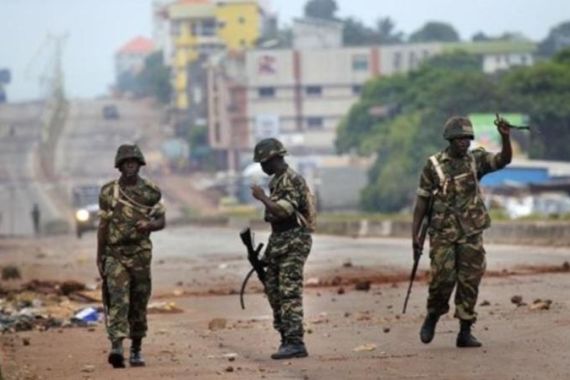Scores killed in Guinea ethnic violence
At least 54 people burned or hacked to death in clashes between rival ethnic groups in West African nation, says doctor.

At least 54 people have been burned alive or hacked to death in ethnic clashes in the west African state of Guinea, a medic said, adding that all the victims had been identified.
The doctor, from a hospital in N’Zerekore, the country’s second-largest city, said on Wednesday there were more bodies in the mortuary that had not yet been identified because several “have no head, while others have no identity papers”.
“For the 54 identified, we went on their identity documents. That has helped us a lot,” he said, adding that the bodies would be returned to the Guerze and Konianke communities.
The doctor spoke on condition of anonymity because he was not authorised to speak to the media.
The violence, which came less than two months before legislative elections, broke out in the southern forest region early on Monday when petrol station guards from the Guerze tribe in the town of Koule beat to death an ethnic Konianke youth they had accused of stealing.
Fighting quickly spread to the nearby provincial capital N’Zerekore, 570km southeast of the capital, Conakry, leaving 80 people wounded and several homes destroyed.
Authorities had put the death toll at 16 but the figure began to rise sharply as bodies were collected from the streets as an uneasy calm returned to the city on Wednesday.
Security forces were deployed to break up the fighting on Monday but were initially unable to quell the violence despite a curfew imposed by N’Zerekore prefect Aboubacar Mbop Camara.
Tribal chief wounded
A number of witnesses told the AFP news agency Guerzes and Koniankes had been attacking one another with machetes, axes, sticks, stones and firearms, setting fire to houses and cars.
Guerze chief Molou Holamou Azaly Zogbelemou was among those wounded and taken to hospital, Camara told AFP.
A resident of N’Zerekore told AFP an “uneasy calm” had descended and there had been “a slight lifting of the tension”.
Most inhabitants had shut themselves into their homes during the bloodshed but people were beginning to venture outside again, said the resident, adding however that the violence could restart at any time.
Another resident and a medical source both described a fragile calm in N’Zerekore, home to 300,000 people.
Security forces, medical staff and aid workers took advantage of the lull to recover bodies from the streets.
Communal violence is common in the region, near the border with Liberia, where clashes between the two tribes regularly break out over religious and other grievances.
The indigenous Guerze are mostly Christian or animist, while the Konianke – seen as newcomers – are Muslims considered to be close to Liberia’s Mandingo ethnic community.
In Liberia’s civil war, which ended in 2003, rebels fighting the forces of then president Charles Taylor drew much of their support from the Mandingo community.
The Guerze, known as Kpelle in Liberia, were generally considered to be supporters of forces loyal to Taylor, who was jailed last year for “aiding and abetting” war crimes in neighbouring Sierra Leone.